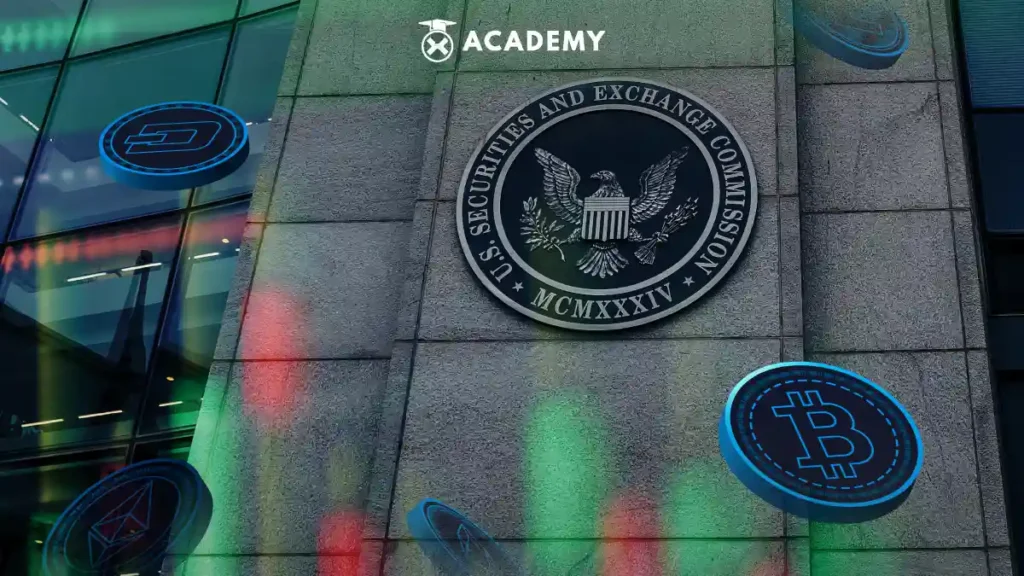In the financial industry in every country, there is always a government agency that has the authority to take care of this matter. In the United States, this institution is called the SEC, or US Securities and Exchange Commission.
The main objectives of the SEC are to protect investors, promote market transparency, and maintain the integrity and efficiency of financial markets.
In financial markets, the role of the SEC is actually very important because this institution seeks to create a fair, safe, and transparent environment for investors and market participants.
This will ultimately help maintain public confidence in financial markets and facilitate sustainable economic growth.
So, to better understand what the SEC is, its history and formation, its main role, and how this institution works, see the full review below.
What is the SEC?

As mentioned earlier, the SEC, or Securities and Exchange Commission, is a government agency in the United States that has a major role in overseeing and regulating the financial markets and securities industry in that country.
Founded in 1934 through the Capital Markets Act, the SEC aims to protect investors, promote transparency, and safeguard financial market integration.
The SEC is known to have broad powers, including oversight of stock exchanges, securities companies, and mutual funds, as well as providing accurate and honest information from companies to the public. In fact, the SEC also has a role in issuing regulations relating to market practices, preventing fraud, and ensuring fair competition in the financial industry.
In Indonesia, an institution that has a similar function to the SEC is the Financial Services Authority (OJK). OJK was established in 2011 through Law Number 21 of 2011 concerning the Financial Services Authority.
Like the SEC, OJK’s primary role is to oversee and regulate various financial services sectors in Indonesia, including banking, capital markets, insurance, and financing institutions.
The main difference between the SEC and OJK is the territorial scope and regulations that apply in each country. The reason is, the SEC operates in the United States, while the OJK operates in Indonesia.
In addition, the rules and regulations governing finance and capital markets will also vary between the two countries, reflecting differences in legal and economic systems.
However, the main objectives of these two institutions remain the same, namely to protect investors, ensure market transparency and integrity, and maintain the stability of the financial sector as a whole.
Despite differences in context and scope, the SEC and OJK have a crucial role in creating a healthy and secure financial environment for the public and market participants in their respective countries.
History of the SEC and Its Formation
It is important to understand that before the SEC was created, the stock market in the United States experienced various problems and instability.
After the Great Economic Crisis, or Great Depression,” in 1929, known as the Great Depression, it was revealed that practices that were detrimental to investors, such as lack of transparency and fraudulent practices, had been rampant in financial markets.
As a result, the government also felt the need to create an institution that would supervise and regulate the stock market and ensure protection for investors.
Therefore, in 1934, the United States Congress passed the Securities Exchange Act, which established the Securities and Exchange Commission (SEC) as the federal agency responsible for overseeing and regulating the securities markets.
In its history, the SEC has had several milestones, including the publication of the Securities Act of 1933 or the Securities Act of 1933. This law became one of the first pieces of legislation issued by the US government after the formation of the SEC.
This law requires companies wishing to sell their shares to the public to provide accurate and honest information about the investments being offered.
Then, in 2000, the FD (Fair Disclosure) Regulation was issued, which was introduced to prevent discriminatory practices in providing financial information to institutional investors compared to individual investors. The aim is to create equal access to public information.
In 2002, the Sarbanes-Oxley Act was born, which was passed in response to major financial scandals at companies such as Enron and WorldCom.
The law introduced stricter accounting standards, increased the transparency of financial reporting, and strengthened corporate executives’ responsibility for the accuracy of financial reports.
The SEC’s next milestone was when the global financial crisis occurred in 2007–2008. This global financial crisis is an important test for the SEC.
A number of changes in financial regulations and practices were introduced in response to the crisis, with a focus on increasing oversight of large financial institutions.
Finally, in 2010, the Dodd-Frank Wall Street Reform and Consumer Protection Act was born. The Dodd-Frank Act was enacted as a direct response to the global financial crisis.
The legislation introduces a number of significant changes to financial regulation, including the creation of the Consumer Financial Protection Bureau and increased transparency of derivatives.
Recognizing the Main Role of the SEC
The SEC has several key roles that are critical to overseeing financial markets and protecting investors. The following is a detailed explanation of the main roles that need to be known, including:
1. Protect investors
The SEC requires companies that list their shares on an exchange to provide investors with accurate, honest, and comprehensive information. This includes financial reports, information about management, business risks, and significant changes in the company.
The SEC also monitors and regulates insider trading practices, namely stock trading based on confidential information that is only known by internal company parties. This prevents certain people from gaining an unfair advantage from information that is not publicly available.
Not only that, but the SEC also has the authority to investigate and take firm action against legal violations in the financial markets, including fraudulent practices, market manipulation, and other violations. These legal actions include financial sanctions, bans on market participation, and criminal prosecution if necessary.
2. Regulate financial markets
Please note that the SEC plays an important role in regulating and overseeing the operations of the stock exchange. This institution ensures that the rules and procedures implemented by the exchange facilitate fair, open, and transparent trading.
In addition, the SEC also issues regulations related to public offerings, share buybacks, transaction structures, and various other aspects of financial instruments. It helps create an environment where investors can participate with confidence.
3. Supervision of public companies
The SEC ensures that listed companies present accurate and honest financial reports. The SEC will examine the report to ensure compliance with applicable accounting and disclosure standards.
The SEC also has a role in overseeing auditing institutions that audit the financial statements of public companies. They ensure audit quality and auditor independence.
How Does the SEC Work?

The SEC works by conducting oversight involving several processes, tools, and methods designed to supervise entities in the financial markets. The following is an overview of how the SEC works, namely:
-
Process supervision
Companies wishing to list their shares on an exchange or sell securities to the public must register with the SEC. During the registration process, companies must provide detailed information regarding their operations, finances, management, and business risks.
Once a company is registered, the SEC performs regular oversight of the financial reports and other information submitted by the company. This includes checking the company’s compliance with applicable accounting and disclosure standards.
The SEC has the power to investigate legal violations by companies or individuals in the financial markets. They can request documents, data, and information from related parties, as well as carry out further checks to determine whether any violations have occurred.
If the SEC finds violations of the law, this agency can take legal action, including issuing warnings, issuing financial sanctions, and even filing criminal charges in collaboration with other law enforcement agencies.
-
Tools and methods
Regarding tools and methods, the SEC is known to operate the EDGAR (Electronic Data Gathering, Analysis, and Retrieval) system, which allows companies to submit financial reports and other information electronically. This will make it easier for the SEC to collect and analyze information about the company.
On the other hand, the SEC can issue letters of reprimand or administrative orders to companies or individuals who violate the law. This can include taking action to correct violations, paying fines, or stopping certain activities.
The SEC can also conduct audits of a company’s financial statements to ensure compliance with accounting and disclosure standards. They can also conduct further checks to investigate violations or illegal practices.
Please note that the SEC often collaborates with other bodies such as audit agencies, stock exchanges, and law enforcement agencies to obtain information and take necessary actions in supervision.
Furthermore, the SEC also encourages companies to provide accurate and honest information to investors and the public. Through strict regulations regarding disclosure, they ensure that relevant information is made available to all interested parties.
Conclusion
In conclusion, the Securities and Exchange Commission (SEC) has a crucial role in the financial markets, with the primary goals of protecting investors, ensuring transparency, and maintaining the integrity of the financial markets in the United States.
The SEC has a role in regulating the stock, bond, and investment markets, as well as overseeing companies that list their shares on the stock exchange. In this way, the SEC helps create a financial environment that is fair, secure, and full of integrity.
Furthermore, the importance of supporting these institutions cannot be understated. This is because the SEC plays an important role in maintaining public confidence in financial markets, which is a key element in sustainable economic growth.
By protecting investors from harmful practices, preventing insider trading and fraud, and overseeing companies to provide accurate information, the SEC helps create a healthy environment for investment and trading.
Basically, support for the SEC is needed to ensure that its supervisory and regulatory duties can be carried out effectively. Adequate funds, resources, and authority are required to carry out these tasks well.
The security and integrity of financial markets depend on the effectiveness of these institutions in preventing harmful practices and maintaining market transparency.
Are You Interested in Crypto investments?
So, now you understand what the SEC is, its history and formation, its main role, and how this institution works.
Next, if you are interested in investing in crypto, it’s a good idea for you to know first that the crypto market is very volatile.
Volatility refers to large and rapid price fluctuations in a short period of time. This phenomenon is a key characteristic of the crypto market that differentiates it from traditional financial markets.
Therefore, make sure to invest in crypto on an official, licensed, and trusted platform such as INDODAX so that the security of your investment is guaranteed.
Come on, start investing in crypto right now!








